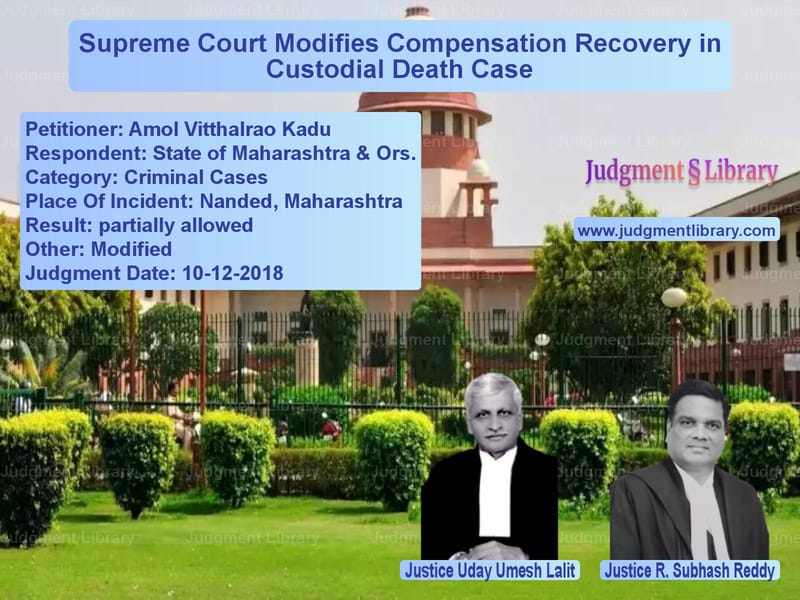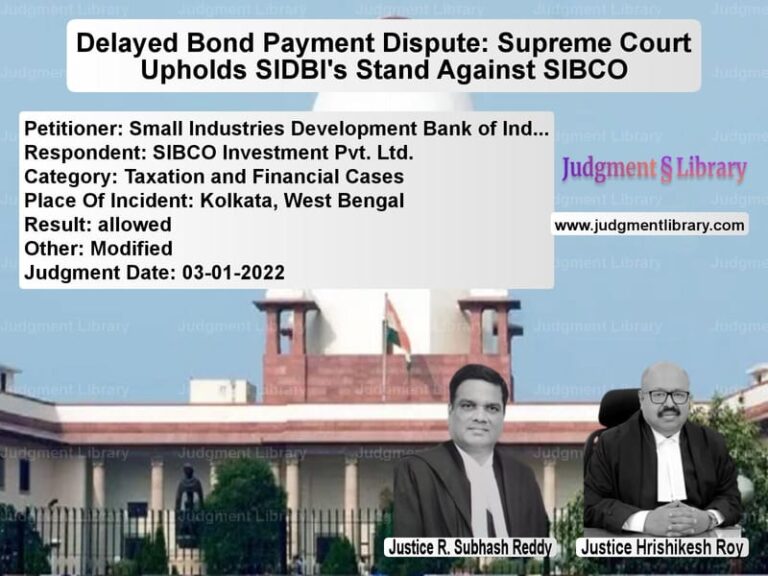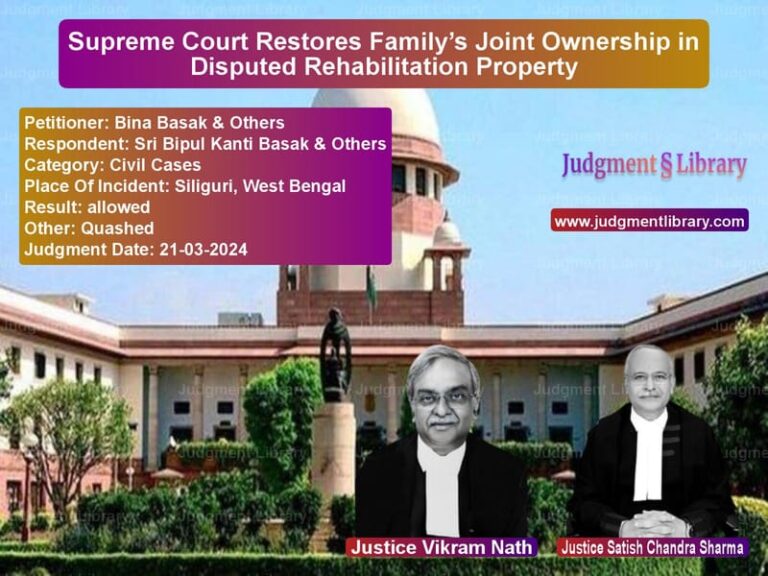Supreme Court Modifies Compensation Recovery in Custodial Death Case
The case of Amol Vitthalrao Kadu v. State of Maharashtra & Ors. deals with a crucial issue of custodial death and the liability of police officers in such cases. The Supreme Court modified a Bombay High Court order that had directed the recovery of compensation from a police officer, stating that such liability must first be legally established before recovery. The ruling highlights the importance of due process and accountability in cases of custodial violence.
Background of the Case
The case arose from the custodial death of one Pravin, who died while in police lock-up at Vajirabad Police Station, Nanded. His family, including his parents and daughter, filed a Criminal Writ Petition (No. 39/2015) in the Bombay High Court, alleging that Pravin’s death was unnatural and resulted from police brutality.
After considering the case, the High Court directed the State of Maharashtra to pay Rs. 7 lakh as compensation to Pravin’s family. However, the court also ruled that this amount should be recovered from the Investigating Officer (IO) in charge at the relevant time.
The police officer, Amol Vitthalrao Kadu, challenged this decision before the Supreme Court, arguing that he should not be held personally liable without a proper inquiry.
Key Issues in the Case
- Whether compensation for custodial death should be recovered directly from an officer without legal proceedings establishing liability.
- Whether the State should first bear the compensation cost and then recover it from the responsible officers after due process.
- The applicability of previous Supreme Court judgments on compensation in custodial death cases.
Arguments by the Petitioner (Police Officer)
The petitioner, represented by Senior Advocate Subodh S. Patil, contended:
- He was not proven guilty in any judicial or departmental proceedings regarding Pravin’s death.
- The High Court erred in directing recovery from him without first determining his culpability.
- The principle of vicarious liability applies, meaning the State should first compensate the victim’s family and then recover the amount from the guilty officer after a proper inquiry.
- The High Court’s order was contrary to legal principles established in previous cases, including D.K. Basu v. State of West Bengal (1997).
Arguments by the Respondents (State and Victim’s Family)
The respondents, represented by Advocate Nishant Ramakantrao Katneshwarkar, countered:
- The High Court correctly imposed liability on the officer, as custodial deaths involve a high degree of police responsibility.
- The State should not bear the financial burden alone when individual officers are responsible for violations of fundamental rights.
- The officer was in charge of the police station at the time of Pravin’s death, making him prima facie liable.
Supreme Court’s Observations
The Supreme Court carefully analyzed the principles governing custodial death cases and compensation. It made the following key observations:
1. Compensation for Custodial Death Must Be Paid by the State
The Court reaffirmed that in cases of custodial death, the responsibility to pay compensation initially falls on the State. Referring to D.K. Basu v. State of West Bengal (1997), the judgment stated:
“Monetary compensation is an effective remedy for redressing the infringement of fundamental rights due to custodial violence. The State is vicariously liable for the actions of its officers.”
2. Recovery from Individual Officers Requires Due Process
The Court held that liability for custodial death must first be legally established through departmental or criminal proceedings before recovering compensation from an officer. It stated:
“Unless and until the liability or responsibility is fixed, the appellant ought not to have been directed to make over the payment.”
The Court cited Delhi Airtech Services Private Limited v. State of Uttar Pradesh (2011), which emphasized that recovery from officials must follow a legal inquiry.
3. The High Court’s Order Was Premature
The Supreme Court found that the High Court had erred in directing immediate recovery from the officer without establishing his guilt:
“While awarding compensation, the emphasis must be on the compensatory element, not on the punitive element. Punishment for an offence must be left to criminal courts.”
Supreme Court’s Judgment
The Supreme Court ruled:
- The State must pay Rs. 7 lakh to Pravin’s family as compensation.
- However, the amount should not be recovered from the police officer until liability is established in departmental or judicial proceedings.
- The State has the liberty to recover the amount from the responsible officers after the conclusion of the inquiry.
- The High Court’s order directing immediate recovery was modified accordingly.
Impact of the Judgment
This ruling has significant legal implications:
- Clarifies Compensation Principles: The judgment reinforces that the State must bear the cost of compensation initially and recover it only after due process.
- Protects Officers from Arbitrary Recoveries: It ensures that police officers are not unfairly penalized without a fair inquiry.
- Strengthens Human Rights Protection: The ruling emphasizes that custodial deaths require accountability but must follow legal procedures.
- Guidance for Future Cases: The decision sets a precedent for handling compensation in similar custodial death cases.
Conclusion
The Supreme Court’s ruling in Amol Vitthalrao Kadu v. State of Maharashtra & Ors. strikes a balance between ensuring accountability in custodial death cases and protecting individuals from arbitrary financial recoveries. By modifying the High Court’s order, the Court reaffirmed that compensation must be paid immediately by the State, while individual liability should be determined through a proper legal process. This judgment serves as an essential precedent in cases involving custodial violence and compensation claims.
Petitioner Name: Amol Vitthalrao Kadu.Respondent Name: State of Maharashtra & Ors..Judgment By: Justice Uday Umesh Lalit, Justice R. Subhash Reddy.Place Of Incident: Nanded, Maharashtra.Judgment Date: 10-12-2018.
Don’t miss out on the full details! Download the complete judgment in PDF format below and gain valuable insights instantly!
Download Judgment: Amol Vitthalrao Kadu vs State of Maharashtra Supreme Court of India Judgment Dated 10-12-2018.pdf
Direct Downlaod Judgment: Direct downlaod this Judgment
See all petitions in Custodial Deaths and Police Misconduct
See all petitions in Fundamental Rights
See all petitions in Public Interest Litigation
See all petitions in Judgment by Uday Umesh Lalit
See all petitions in Judgment by R. Subhash Reddy
See all petitions in partially allowed
See all petitions in Modified
See all petitions in supreme court of India judgments December 2018
See all petitions in 2018 judgments
See all posts in Criminal Cases Category
See all allowed petitions in Criminal Cases Category
See all Dismissed petitions in Criminal Cases Category
See all partially allowed petitions in Criminal Cases Category







